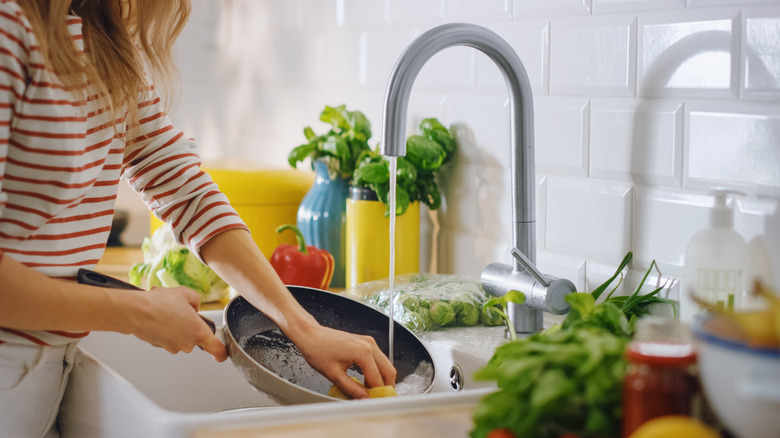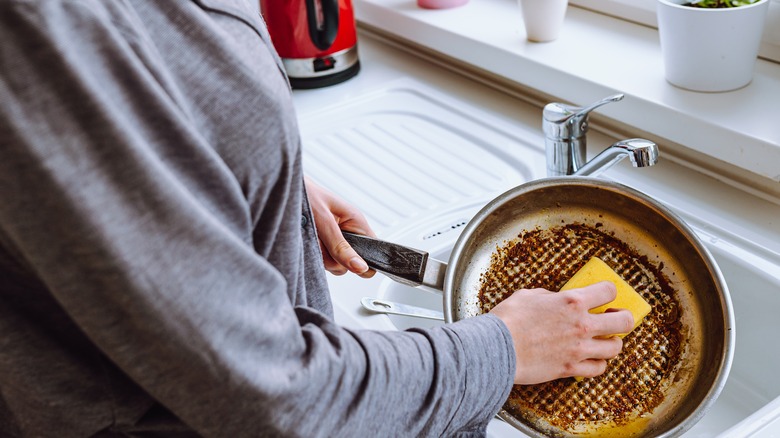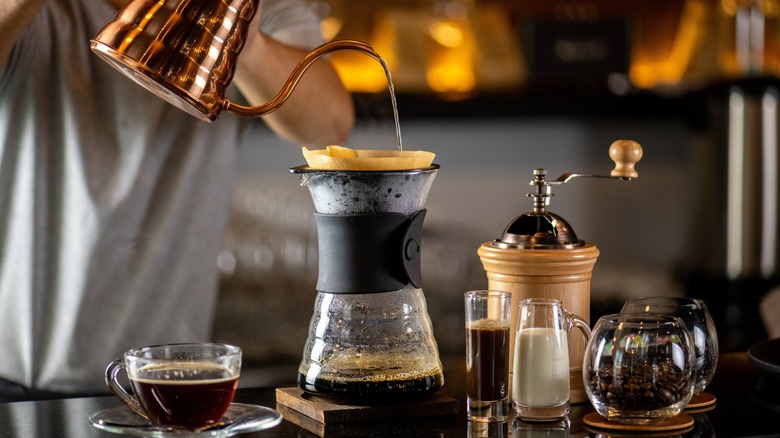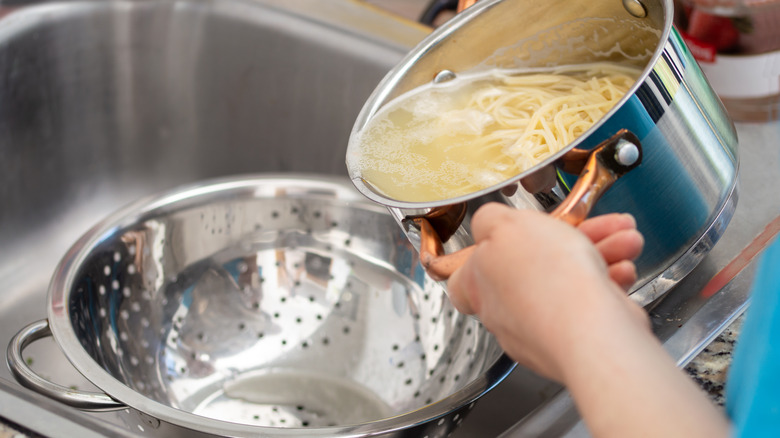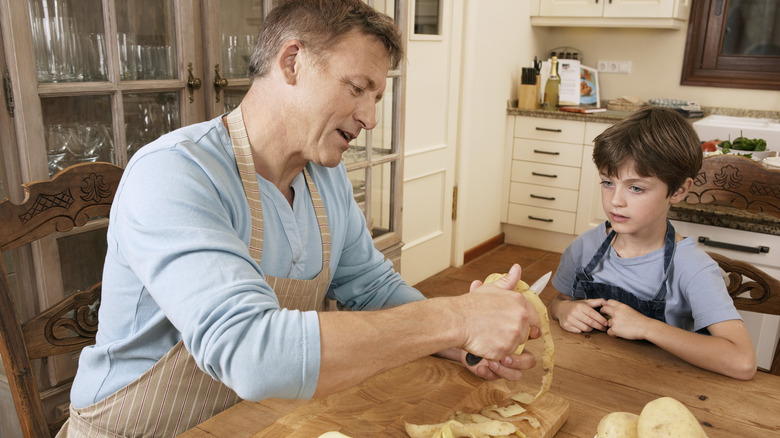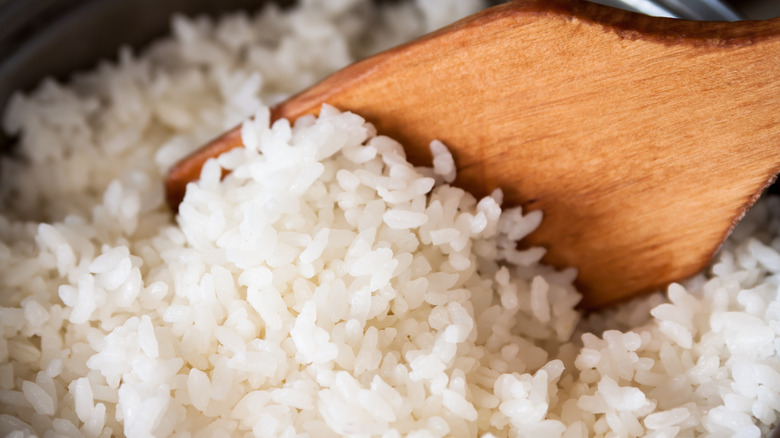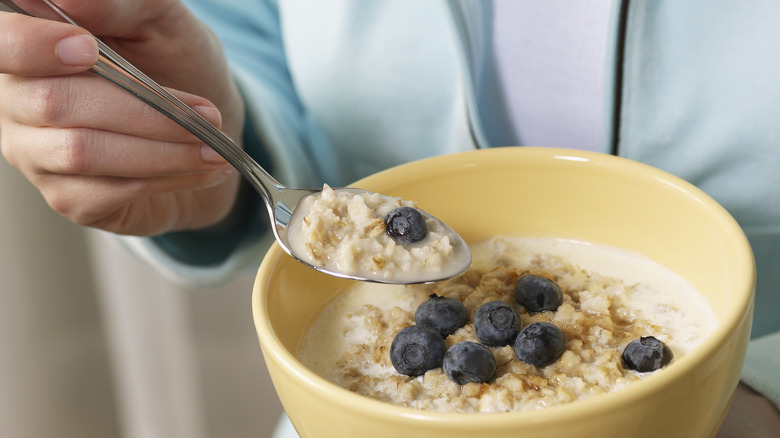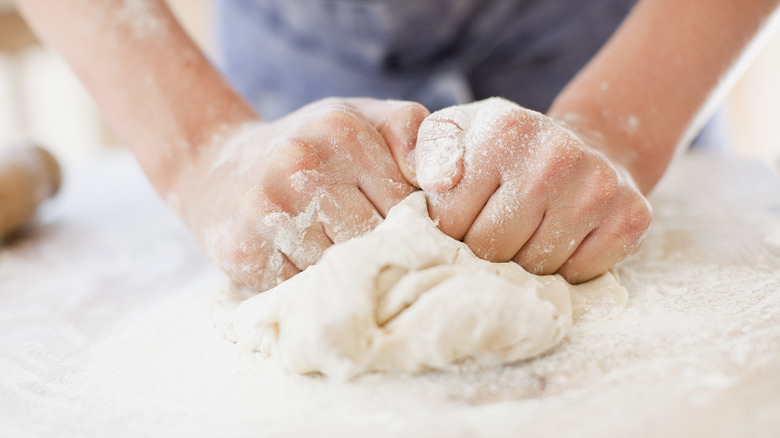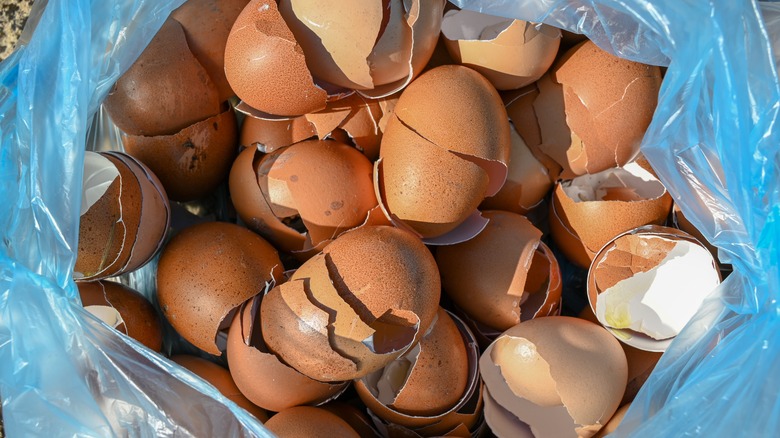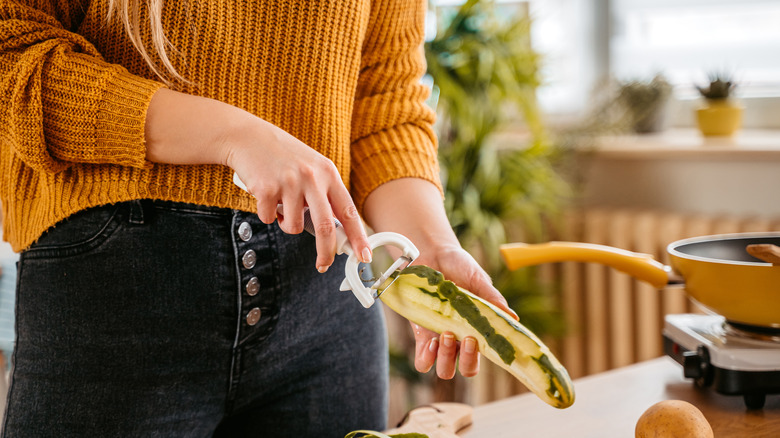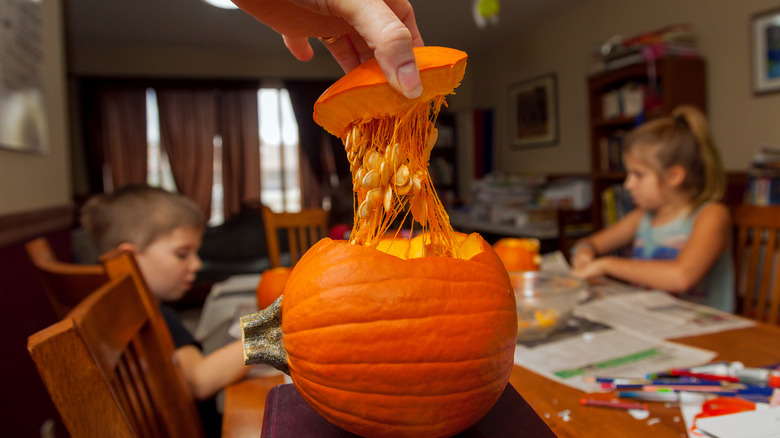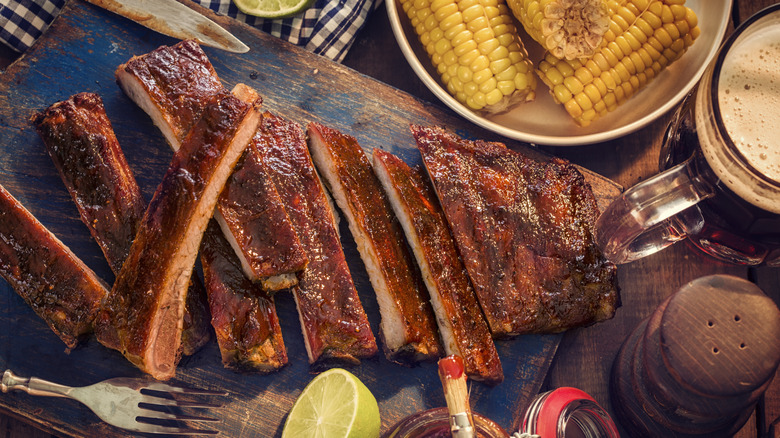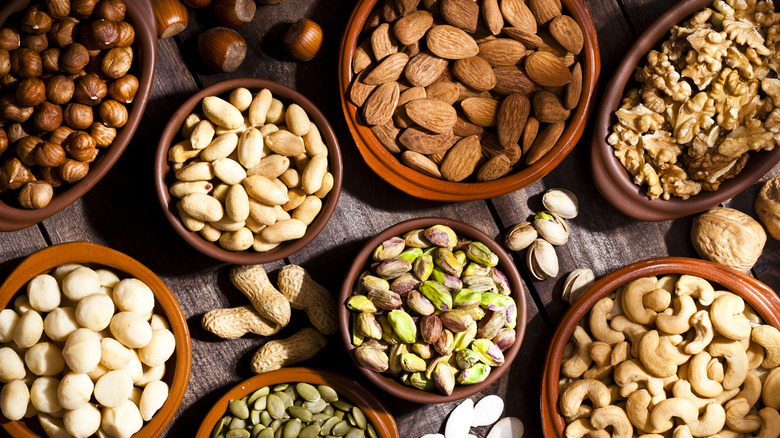13 Foods You Should Never Put Down Your Kitchen Sink
So you've just finished cooking dinner and have leftover oil, eggshells, or vegetable scraps to get rid of. Or, maybe you have leftovers that have gone bad in the fridge that you need to discard. In these situations, tossing the food down the kitchen drain or garbage disposal often feels like the easiest and quickest solution. While that's true for some food items, for others, sending them down the drain can cause big problems. A lot of food items may seem to go down your garbage disposal without an issue, only to wreak havoc on your plumbing later on.
By researching advice from professionals, we've compiled a list of foods that you should never put down the drain, as well as the proper way to safely dispose of these items. Although it may take a little more time to clean up, you'll be grateful in the long run not to deal with the complications caused by tossing these items down the drain.
1. Cooking oil
Although fried food like crispy chicken or bacon is a delight to eat, it's less fun to clean up. You've likely heard that you shouldn't pour oil down the sink, but when you have a skillet of leftover cooking oil, dumping it down the drain can still feel like the easiest solution. Resist that temptation! Pouring oil in the sink is a big mistake that can cause severe damage to your plumping. Although it seems like the oil should slide down the drain without a problem, it will solidify as it cools and create a blockage in your pipes. The price and inconvenience of getting your drain fixed far outweigh the convenience of pouring oil down the drain in the first place.
Even if you've poured cooking grease down the drain before and not run into any issues, it's still a good idea to stop this habit. As Lars Olsson, a professional plumber, told The Guardian, "If you do put a small amount [of oil] down, you'd be really unlucky that it does any damage. But it does happen. If you're putting large amounts down, it will happen."
Now, you may be wondering what you should do with leftover cooking oil. It's best to dispose of it in your garbage. To avoid a greasy mess, pour the oil into an old jar or milk jug that you were planning to dispose of, add the lid, and throw the container in the trash.
2. Old coffee grounds
After you've made your morning coffee, and you're left with the used coffee grounds, what do you do with them? If your answer is dumping the coffee filter contents in the sink and rinsing them down the disposal, you risk causing a problem for your plumbing. Dumping old coffee grounds down the drain may be fine at first, but it can build up over time.
This may seem strange as you can put larger food items down the drain without an issue. But because coffee grounds are small, they can get caught in your drain. And unlike other types of food, the grounds won't dissolve or start to break down in water. On the contrary, as water runs over them, the coffee grounds will start to clump and can eventually build up to cause a block in your sink.
If you've only dumped your coffee grounds down the sink a handful of times, you likely won't run into this issue. However, if disposing of coffee grounds in your sink is part of your morning routine, the grounds will build up and cling to each other until you run into a big issue. Avoid potential problems by tossing your coffee grounds in the trash or compost.
3. Pasta water
After cooking pasta, draining the cooking water into the sink seems like the obvious next step. And unlike other foods on this list, pasta water shouldn't have negative effects on your drain. But you still shouldn't discard it in the sink. By doing so, you're throwing a valuable ingredient down the drain. Although it may seem like cooking waste, pasta water is an excellent ingredient that you can use to make rich and silky sauces. The water becomes starchy while cooking the pasta, and because of this, it's an excellent thickening agent that helps to bind ingredients together. If you're making a classic pasta recipe, like spaghetti bolognese, you can save some of the pasta water to add to your sauce. It acts as an emulsifier to make your sauce rich, silky, and delicious.
Pasta water can also be used in other recipes. Save it to use as a base for soups, sauces and dressings. Or, use it to steam vegetables or cook beans. To easily save pasta water for later use, use tongs to remove your pasta from the pot rather than draining the water. Or, place your colander over a larger pot. Then, drain the pasta water into the pot and pour it into an airtight container to store for later.
4. Potatoes
Starchy foods like potatoes should not go down the drain. When making baked potatoes, hash browns, casseroles, fries, or other classic potato dishes, avoid throwing potato peels and scraps in the sink. The same rule applies to raw and cooked potatoes. If you have a garbage disposal, it may break down the potato pieces just fine, but the problem comes once the potatoes are down the drain. Because of potatoes' heavy starch content, they become sticky in the drains. "Potatoes break down into a mush that can clog your drain and also gum up your disposal," Paul Abrams, public relations director for Roto-Rooter, told Consumer Reports.
You'll run into the same issue with soft mashed potatoes or other creamy potato dishes. And you should never put instant mashed potatoes down the drain. Although the powdery substance looks easy enough to rinse down the garbage disposal, this is a huge mistake. The dehydrated potatoes rehydrate when you rinse water down the drain, which can cause a major blockage. You'll be far better off tossing your potato scraps, old mashed potatoes, or out-of-date instant mashed potatoes in the garbage.
5. Rice and pasta
Both pasta and rice absorb water to expand and become sticky as they cook. It's important to keep this in mind when you're disposing of cooked rice or pasta. Because rice and pasta expand in water, they can cause problems to your plumbing. As you continue using the sink and water runs over the rice or pasta, they will further expand, become sticky, and ultimately block your drain. If you continue putting rice down the drain, the grains can also stick to each other to create a more significant clog over time.
This is just one more reason not to drain pasta water into the sink. It's far too easy for slippery noodles to fall into the sink and slip down the drain as you are trying to drain the water. And as discussed earlier, you should be saving pasta water anyway. So, use this as another motivator not to toss your pasta water in the drain and avoid any risk of clogging your sink with noodles.
Instead of tossing leftover rice and noodles down the sink, you can avoid drain blockages and food waste by using them in other delicious recipes. Leftover rice is perfect for making fried rice, soups, risotto, and other delicious recipes. And leftover pasta is excellent for adding to soups and casseroles.
6. Oatmeal
Like rice, oatmeal expands when it comes in contact with water. Due to this, it can become a large drain blockage, even if you only pour a small amount down your drain. If you can picture the thick consistency of oatmeal, then you may already see the issue here. And things only get worse if the oatmeal dries after it's gone down the sink. Dried oatmeal can harden in a cement-like fashion, posing serious risks to your plumbing. It's why you should never pour oatmeal down the drain.
To avoid a call to your plumber, you can toss uneaten oatmeal in the trash; if you're worried about it leaking, pour it into a disposable container the same way you would with oil. Or, you can store the oatmeal for later. After cooking, you can keep leftover oatmeal in a covered container in your fridge for three to four days. When you're ready to serve, just add a tablespoon of water to the leftover oatmeal and reheat it on the stovetop over medium-low heat or in your microwave. Remember to dress up your bowl of oatmeal with nuts, fruits, and other fresh toppings to add new and exciting flavors to your leftovers.
7. Flour
Because flour is so finely ground, you might think it can go down the drain with no problem. Unfortunately, this is not the case. Dusting flour down the sink during kitchen cleanup seems easy but is bad for your drain. This is because the flour coagulates when it comes in contact with water. So, as you're rinsing the flour down the drain, it forms a glue-like mixture with the water that can stick to the sides of your drain. What's worse is that once it's there, the flour can stick to other food and non-food items you rinse down the drain, ultimately leading to drain blockage that may be difficult to fix on your own.
It's best to discard any leftover flour in the compost or trash. But brushing flour directly into the trashcan can lead to a mess in your kitchen as the light powder can fly everywhere. To easily dispose of flour without making a mess, add a little water to the remaining flour. The water and flour will combine to make a thick paste that's easier to toss in the trash without the dust getting all over your kitchen.
8. Eggshells
Eggshells are a hazard to the sink because they do not break down in water. Though you can break the delicate shells into small pieces with your garbage disposal, this doesn't solve the problem. These eggshell bits can get caught in your kitchen sink pipes and cause a build-up in the drain, especially if you have older pipes. According to a survey shared by Consumer Reports, 33% of people reported putting eggshells down their garbage disposal, but to stay safe and avoid the risk shells pose to your drains, it's better to find another way to dispose of them.
You can even take advantage of the leftover shells. Instead of throwing them down the disposal or in your trash, use eggshells as a natural fertilizer. The calcium in eggshells is excellent for plants. Try breaking down your eggshells and mixing the pieces with the dirt in your garden to add minerals to the soil that your plants will love. You could also cook eggshells and mix them with birdseed to put in your bird feeder (via Happy Egg).
9. Milk products
If you have an expired jug of milk in the fridge, your first instinct is likely to pour the whole thing down the drain, but this is not a good idea. Milk is slightly different from a lot of items on this list because it won't necessarily damage your plumbing. You can usually pour milk down the drain and not worry about it clogging your pipes, although doing this consistently can lead to fat building up in your pipes. But a small amount of milk, cream, yogurt, or other milk product should go down your sink easily. So, what's the problem?
Although pouring milk down the drain likely won't cause damage to your plumbing, it hurts the environment. Milk is considered a polluting substance. After going down the drain and entering the environment, it poses a threat to aquatic and plant life in local bodies of water. This is mostly because milk takes a lot of oxygen to break down, which results in oxygen typically used by animal and plant life being used up (via DS Smith). To avoid this environmental hazard, instead, seal the milk jug and throw the whole thing in the trash, or pour the old milk into another sealable container to throw away.
10. Vegetable scraps
Many of us are guilty of slicing or peeling vegetables over the sink or brushing the cutting board scraps into the garbage disposal. In fact, Consumer Reports found that 59% of people discard their vegetable scraps in the garbage disposal. But just because the majority of people are doing it doesn't mean it's a smart idea. This is one case where it's better to be in the minority.
Fibrous vegetables, such as celery, artichokes, and asparagus, can pose a challenge to your garbage disposal, especially if you have an older disposal. Even if you have a high-quality disposal, stringy pieces from the vegetables can cause a block in your drain after going through the disposal blades. Vegetable peels may also cause trouble. "Individual peels are very thin and don't have much heft to them, so they can actually slip through the grates," Eric Schultz, director of product management at InSinkErator, explained. "And they can cause clogs in the same way that fibrous vegetables do." So, instead of peeling and slicing your vegetables over your garbage disposal, switch to the trash can or a compost bag for easy waste disposal that won't ruin your plumbing.
11. Pumpkin pulp
When you're left with a mess of pumpkin pulp after carving a jack-o-lantern, running the sticky innards down the drain seems like an easy fix. But this can lead to a plumbing problem that's far scarier than any of your Halloween decorations. Pumpkin pulp is particularly difficult to drain because of its consistency. Its sticky and stringy texture causes it to stick to the inside of your pipes rather than washing away. Once it's stuck in the drain, pumpkin can cling to other food items you rinse down the drain. And as it dries, the pumpkin pulp will harden to make a large blockage that you'll likely need professional help to clear away. The large seeds in the pumpkin pulp only worsen this issue.
So, avoid this particular Halloween nightmare by disposing of the pumpkin another way. You can also get creative and make use of the pumpkin guts by pureeing them to add seasonal flavor to soups or smoothies.
12. Bones
After eating fish, poultry, or meat, you'll be left to dispose of the bones. Even if you have a powerful garbage disposal, you should not be putting bones down the sink. Because bones are so hard and strong, the disposal will struggle to break them down, and you may break or damage the disposal blades. If the bones do make it past the blades, the hard pieces can cause blockages further down the pipes. Although small, delicate bones like chicken or fish may go down easier, it's still not advisable to consistently send them down the disposal. They'll also dull the blades and cause more damage over time.
Another reason not to toss out bones and meat scraps in the sink is that you can use them to make bone broth. After simmering bones in water, you'll be left with a collagen-rich, savory broth that you can use in soups, sauces, gravies, and other recipes. Or drink bone broth on its own to give yourself a nutrient boost.
After making broth, you'll still need a way to dispose of the bones other than the sink. You can add the remaining meat bones to your compost, or if composting isn't an option for you, simply toss them in the trash.
13. Nuts and seeds
Nuts and seeds are both terrible ideas to put down the drain. For one thing, hard nuts, large seeds, and fruit stones can damage and dull the blades of your garbage disposal. Although the disposal may seem to run fine after putting these hard foods down the drain, it causes a lot of damage. Doing it repeatedly will dull the blades until they're less powerful and ill-equipped for breaking down softer food items that would normally be fine (via Drain Terrier). This may lead to you needing to get the disposal fixed or replaced, which is an unnecessary expense you can avoid by being more careful with the machine.
Furthermore, if your disposal blades grind up the nuts or seeds, this can create another issue. Finely ground nuts and seeds will form a gummy, paste-like substance, which can build up in the pipes and cause a clog in your sink drain. To avoid these problems and expensive fixes, simply toss nuts, seeds, and fruit stones into the trash and save yourself the headache.
